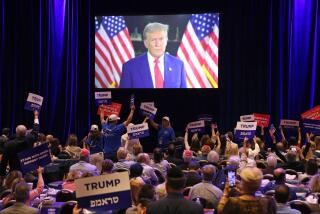Anxious Palestinians Also Await the Final Word on Who Won
- Share via
BETHLEHEM, West Bank — Until the last vote is counted, Nidal Karem said Thursday, he will try to hold on to a tiny shred of hope that Benjamin Netanyahu will not become Israel’s prime minister.
But one day after a national election that appeared to give the rightist Likud Party leader the slimmest of victories over the Labor Party’s incumbent, Shimon Peres, Karem sat disconsolately on the hood of his car in this Palestinian town, worrying about the future.
Karem, 25, said he feared that a Netanyahu triumph could signal the end of the Israeli-Palestinian peace process. And he said it could mean greater restrictions for him and other Arab residents of Bethlehem and neighboring West Bank communities.
“Inshallah, la,” Karem said quietly: “Please God, no.”
Palestinian leader Yasser Arafat, who joined Peres and former Prime Minister Yitzhak Rabin in a landmark 1993 peace agreement, made no comment Thursday on the election returns and ordered other top Palestinian officials to remain silent as well.
Late in the day, Arafat met in the Gaza Strip with Edward Abington, the U.S. consul in Jerusalem who is the Clinton administration’s main contact with the Palestinians. Abington described the Palestinian leader’s mood as concerned and somber.
“Needless to say, he is quite concerned about what this means for the future of the peace process,” said Abington, who had stayed in close telephone contact with Arafat into the early morning hours Thursday as the votes were counted. “He has developed very close relations with the Labor Party people, and he doesn’t have that with Likud.”
Abington sought to reassure Arafat, reminding him that the first Israeli-Palestinian steps toward peace in the region had won broad support from the United States and other nations.
Arafat is scheduled to meet in Amman next week with Jordan’s King Hussein and Egyptian President Hosni Mubarak.
In Gaza, the militant Islamic movement Hamas sounded a warning. The group issued a statement that the election of Netanyahu would be tantamount to an act of war against the Palestinians.
But Hanan Mikhail-Ashrawi, an independent member of the Palestinian Legislative Council, or parliament, said the Likud leader’s apparent victory does not mean Palestinians should panic.
“Given the fact that the peace agreement was not one we signed with a party but [with] a government, for the credibility of the state of Israel it must honor its agreements,” Ashrawi said. “Many countries also have invested in this process and have the will to have it succeed.”
In addition, she said, the “realities on the ground”--Israel’s withdrawal of troops from the Gaza Strip and portions of the West Bank, the establishment of a semiautonomous Palestinian Authority in the area and the election of the Palestinian parliament--would be difficult, if not impossible, to reverse.
“All these are the building blocks of a state; they cannot be nullified or ignored,” Ashrawi said.
On the West Bank, however, many Palestinians said they feared that Netanyahu would, at a minimum, slow dramatically the pace of negotiations. The final round of Israeli-Palestinian talks, scheduled to take place over the next three years, is to focus on such fundamental issues as control of Jerusalem, the future of Jewish settlements on the West Bank and Palestinian statehood.
Other questions struck even closer to home for Karem and the friends who gathered with him Thursday on Bethlehem’s main street.
If Netanyahu is declared the winner, would he increase funding for the settlements, a move likely to raise tensions between Jewish settlers and Palestinian villagers? Would there be more frequent closures of the roads between the West Bank and Israel proper, preventing Palestinians from reaching their jobs in Israel?
Since February, when Israeli troops closed off much of the West Bank after suicide bombings by Islamic extremists, Karem, a plumber, has been unable to reach his Israeli customers, he said. To support his wife and four children, he has been forced to turn his aging car into a taxi.
“We’re in a crisis, really,” Karem said. “There is no work.”
In nearby Hebron, the last major West Bank city under the direct control of the Israeli army, Mayor Mustafa Natshe called on Peres to move forward immediately with a scheduled pullout of the troops, apparently fearing that redeployment will not occur if Netanyahu assumes the prime minister’s office.
The issue of the army’s evacuation from Hebron, a volatile city that is considered a center of Islamic activism, would probably be viewed as an early, critical test for Netanyahu.
At the Al Salam electronics-repair shop in downtown Hebron on Thursday, one man angrily denounced both Peres and Netanyahu as “dogs” and said the peace process is “a joke,” a puppet show directed by President Clinton.
The real issue, he said, is one of belief, and the only true solution will come from God.
Around the corner at the Al Amal cafe, several other men talked politics and peace processes as they watched cafe owner Naim Muntoor grill chicken over an open fire. Several said they believe that Netanyahu, if victorious, would be obligated to follow through on the land-for-peace concessions. Peres and Netanyahu are “two faces of the same coin,” one said; either would be obligated to proceed with the peace agreement.
No, another said, Peres and his Labor Party are “like a snake, pretending to be in a peace process.” At least Likud would be more honest with the Palestinians, he said. “They are an enemy, but an enemy that doesn’t hide behind false skins.”
Besides, several said, “America will help us.”
More to Read
Sign up for Essential California
The most important California stories and recommendations in your inbox every morning.
You may occasionally receive promotional content from the Los Angeles Times.













